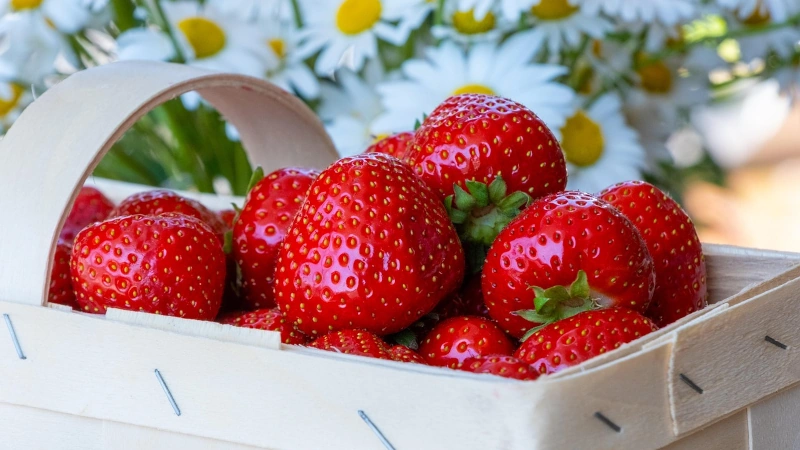The long sought-after fountain of youth may have been hidden in plain sight all along. Three new studies suggest strawberries may be associated with slowing down aging of the brain, cardiovascular system, and gut microbiome.
Keeping the Mind Sharp as We Age
As a person ages, the brain can experience changes that result in impairments in learning, memory, gait, and balance. Sometimes these changes lead to early cognitive decline, disability, or falls among older adults.
In a study by Dr. Shukitt-Hale’s team at the USDA Human Nutrition Research Center on Aging at Tufts University, 37 healthy older adults participated in a two-arm trial in which they consumed either freeze-dried strawberry powder beverages (24g/day, equivalent to two cups of fresh strawberries) or a calorie-matched control powder for 90 days. Participants completed a battery of balance, gait, and cognitive tests at baseline, midpoint, and conclusion of the trial.
Participants in the strawberry group performed better on spatial memory tasks and word recognition tests relative to those in the control group. These findings show that the addition of strawberry to the diets of healthy, older adults can improve some aspects of cognition, although more studies are needed to confirm this finding. “Based on these promising results in healthy individuals, we are now conducting a study among older adults whose health is compromised and we expect to see even greater improvement following strawberry supplementation,” said Dr. Shukitt-Hale.
This research comes on the heels of recent publications that indicate diets higher in long-term flavonoid intake, from foods such as strawberries, could contribute to reducing the risk of Alzheimer’s Disease and related dementias.

Young at Heart
Endothelium is a thin layer of cells that lines every blood vessel in the body. It’s responsible for the relaxation and constriction of veins and arteries, playing a major role in blood flow, blood pressure regulation, blood clotting, and wound healing. High total cholesterol and LDL (the “bad” cholesterol) can impair the function of the endothelium, clog arteries, and lead to heart disease, particularly in later years of life.
A study from Dr. Burton Freeman’s team of researchers at Illinois Institute of Technology asked middle-aged adults with moderately-high LDL cholesterol to drink beverages two times a day made from freeze-dried strawberry powder (25g in each) or a control powder for four weeks. After completing their first assigned beverage, they switched to the other one (strawberry/control) for an additional four weeks.
The health of the endothelium, measured by flow-mediated dilation, improved in the strawberry group one hour after drinking the beverage. Systolic blood pressure decreased two hours after drinking the strawberry beverage compared to the control, and this was more pronounced four weeks after the strawberry intervention.
The findings suggest that strawberries may improve endothelial function and be considered a specific food to include in a heart-healthy diet for aging adults with moderately-high cholesterol.

Promoting “Longevity” Bugs in the Gut
Strawberries act as prebiotics and may increase gut bacteria associated with lean body weight, health, and longevity, according to research findings from UCLA.
The pilot study led by Dr. Li’s team at the Center for Human Nutrition considered whether strawberries would alter the gut microbiota. Rich in vitamin C and polyphenols, strawberries have already shown their potential to decrease LDL cholesterol, blood glucose, insulin resistance, and other disease risk factors. The gut microbiota is the next frontier for scientific exploration of strawberries’ impact on health.
Fourteen adults were asked to follow a “beige” diet low in fiber and polyphenols for 8 weeks. Two weeks in, a 13g strawberry powder drink was introduced to the diet twice a day, for four weeks. Then the participants returned to a beige-only diet for the two final weeks without strawberries.
Drinking strawberry powder beverages twice a day for four weeks was associated with an increase of 24 operational taxonomic units (OTUs), or gut microorganisms. Once the participants returned to a beige-only diet, several of the OTUs reversed back to their pre-strawberry status, suggesting strawberry’s role in influencing the gut bacteria.
Dr. Li shared, “Consumption of strawberry increased the abundance of gut microorganisms that could lead to lean body weight, better health, and longevity.”
Something as simple as making strawberries a regular part of the diet may be the key to delaying aging of both the mind and the body.
The post Can strawberries slow down the aging process? first appeared in The Foundation for Fresh Produce’s Have A Plant® blog.
Written by: California Strawberries
California strawberries are grown by hundreds of family farmers who produce nearly 90 percent of the nation’s strawberries.
Harvested year-round along the coast, California strawberries are low in sugar, high in vitamin C, and provide essential nutrients, fiber, and health-promoting phytochemicals. Research suggests eating just a serving of eight strawberries a day may improve heart health, help manage diabetes, support brain health, and reduce the risk of some cancers.
With an emphasis on sustainable farming practices, the California Strawberry Commission is focused on production and nutrition research, food safety training and education, marketing and communications, trade relations and public policy. To learn more and connect, visit www.californiastrawberries.com.
About The Foundation For Fresh Produce And Have A Plant® Movement


The Foundation for Fresh Produce’s vision is to grow a healthier world by changing the trajectory of human health. The produce industry has the potential to provide solutions for many of the world’s greatest health and economic challenges – especially those surrounding nutrition and hunger.
The Foundation focuses on improving the appeal of fruit and vegetables as an integral part of people’s diets, supporting the development of infrastructure and supply chain solutions that provide easier access, and establishing strategic alliances that enable children and families to form healthier eating habits.
The transformative Have A Plant® Movement inspires consumers with compelling reasons to believe in the powerful role fruits and vegetables can play to fuel happy, healthy and active lifestyles.



